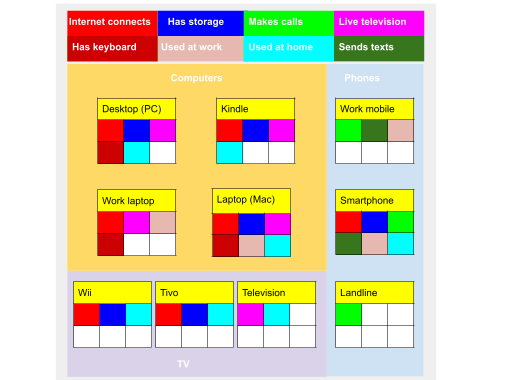Time was when you watched TV on your television, made phone calls on your phone and used a computer to, well, find out how a computer works and make neat records of your gas bills using your newfound expertise with spreadsheets.
Today, if you stop to think, there is a hugely complex overlapping of functions between the devices we use. I don't think I'm particularly techie, but I was surprised to be able to list ten separate devices which I switch between according to mood and what's appropriate (e.g. not playing Words with Friends on my Kindle on a Monday morning in the office.)
Experimenting with Google Docs'
Drawing programme, I have tried to show the similarities and differences between my various gadgets - some limited by technology, others only by habit. I have grouped them under 'computers', 'phones' and 'TV', but the point is that those are pretty artificial distinctions because, if you look at the various capabilities of each, many of them can do the same things: for instance seven out of the ten can connect to the internet and six have internal file storage.

To a large extent, we have moved to a world where, as was being talked about five to ten years ago, content has become operable between devices. For the first time last week, for instance, I watched a whole TV show on my Kindle Fire. It was rather satisfactory, with good sound through the headphones, and a decent picture. It only felt unusual to be able to move the screen around so easily, as one does all the time when reading a book.
It will be interesting to see where this process is going: will the only consideration ultimately be the size of the device, with all devices being capable of much the same functions?
Maybe not: I rather like the fact that my Kindle is more of a receiving that a transmitting device: it's for reading, watching, browsing, even though it could do more if I asked it to. But I don't feel I should be producing stuff when I'm using it - whether emails or documents or even organising photos etc., as I do more on my laptop. So maybe in future devices will appeal to different moods or energy states rather than clustering around functions.





